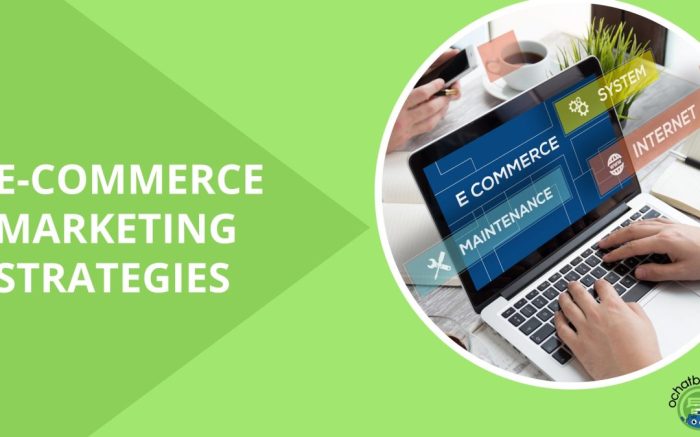
Dive into the world of E-commerce internet marketing strategies, where success meets innovation and creativity. From captivating campaigns to tailored strategies, get ready to elevate your online presence!
Unveil the secrets behind successful e-commerce marketing and discover how to stand out in the digital landscape with strategic branding and targeted advertising.
E-commerce Internet Marketing Strategies
In today’s digital age, having effective e-commerce internet marketing strategies is crucial for the success of online businesses. These strategies help businesses reach their target audience, increase brand awareness, drive traffic to their websites, and ultimately boost sales.
Importance of E-commerce Internet Marketing Strategies
Implementing strong e-commerce internet marketing strategies is essential for businesses to stand out in the highly competitive online marketplace. Some key reasons why these strategies are important include:
- Increasing brand visibility and awareness
- Driving targeted traffic to the website
- Improving customer engagement and loyalty
- Boosting sales and revenue
Successful E-commerce Internet Marketing Campaigns
Several e-commerce businesses have implemented successful internet marketing campaigns to achieve their goals. Examples include:
- Amazon’s personalized recommendation system based on user behavior
- Zappos’ exceptional customer service leading to repeat purchases
- Sephora’s interactive beauty tutorials driving user engagement
Key Components of a Successful E-commerce Internet Marketing Strategy
A successful e-commerce internet marketing strategy should include the following key components:
- Search Engine Optimization () for better visibility in search engines
- Social Media Marketing to engage with customers and build brand loyalty
- Email Marketing for personalized communication and targeted promotions
- Content Marketing to provide valuable information and attract potential customers
- Pay-Per-Click (PPC) Advertising to drive immediate traffic to the website
Tailoring Marketing Strategies for Specific Audiences
To effectively target specific audiences, e-commerce businesses can:
- Segment their target audience based on demographics, behavior, or interests
- Create personalized content and offers to cater to the needs of different audience segments
- Utilize data analytics to track customer behavior and optimize marketing campaigns accordingly
Marketing E-Commerce

In the realm of e-commerce, marketing plays a crucial role in driving sales, increasing brand visibility, and engaging with customers in a digital landscape. Let’s delve into the differences between traditional marketing and e-commerce marketing, the significance of digital marketing in promoting e-commerce businesses, effective marketing strategies utilized by e-commerce companies, and tips on creating a strong brand presence through marketing efforts.
Differences between Traditional Marketing and E-Commerce Marketing
Traditional marketing relies on physical channels like print ads, TV commercials, and billboards, whereas e-commerce marketing is predominantly carried out through online platforms such as social media, email marketing, and search engine optimization. The reach and targeting capabilities of e-commerce marketing are far more precise and measurable compared to traditional marketing methods.
Role of Digital Marketing in Promoting E-Commerce Businesses
Digital marketing is essential for e-commerce businesses as it allows them to reach a global audience, track consumer behavior, and optimize campaigns in real-time. Strategies like social media marketing, influencer partnerships, content marketing, and pay-per-click advertising are commonly used by e-commerce companies to drive traffic and conversions on their websites.
Examples of Effective Marketing Strategies Used by E-Commerce Companies
- Utilizing data-driven insights to personalize marketing messages and offers to customers.
- Implementing email marketing campaigns to nurture leads and encourage repeat purchases.
- Leveraging social media platforms for brand awareness, customer engagement, and community building.
- Collaborating with influencers and affiliates to reach new audiences and build credibility.
- Optimizing website content and user experience for better search engine visibility and conversions.
Tips for Creating a Strong Brand Presence through Marketing Efforts
- Define your brand identity, values, and target audience to create a cohesive marketing strategy.
- Consistently communicate your brand message across all marketing channels for brand recognition.
- Engage with customers through social media, email, and customer service to build brand loyalty.
- Monitor and analyze marketing performance metrics to refine strategies and improve ROI.
- Stay updated on industry trends and competitor activities to stay ahead in the market.
Advertising

In the competitive world of e-commerce, advertising plays a crucial role in reaching a wider audience and driving sales. There are various advertising channels available for e-commerce businesses to utilize in order to promote their products and services effectively.
Advertising Channels
- Social Media Advertising: Platforms like Facebook, Instagram, and Twitter offer targeted advertising options to reach specific demographics.
- Search Engine Marketing (SEM): Utilizing Google AdWords and Bing Ads to appear in search results for relevant s.
- Display Advertising: Placing banner ads on websites and apps to increase brand visibility.
- Email Marketing: Sending promotional emails to subscribers with personalized offers and product recommendations.
Targeted Advertising in E-commerce
- Targeted advertising is crucial in e-commerce as it allows businesses to focus their marketing efforts on specific demographics, interests, and behaviors of their target audience.
- By targeting the right audience, e-commerce businesses can increase conversion rates and ROI by delivering relevant ads to potential customers.
Measuring Advertising Campaign Effectiveness
- Key Performance Indicators (KPIs) such as click-through rates, conversion rates, and return on ad spend (ROAS) are essential metrics to measure the effectiveness of advertising campaigns in e-commerce.
- A/B testing different ad creatives, targeting options, and messaging can help optimize campaigns for better results.
Successful E-commerce Advertising Campaigns
- Amazon’s personalized product recommendations based on previous purchases and browsing behavior have been highly successful in driving sales and increasing customer engagement.
- Wish’s aggressive social media advertising campaigns targeting bargain hunters and offering discounted products have helped them gain a strong foothold in the e-commerce market.
Affiliate Marketing
Affiliate marketing is a performance-based marketing strategy where businesses reward affiliates for driving traffic or sales to their website through the affiliate’s marketing efforts. This type of marketing benefits e-commerce businesses by expanding their reach, increasing brand awareness, and generating more sales without upfront costs.
Key Elements of a Successful Affiliate Marketing Program
- Clear commission structure: Define the commission rates and terms for affiliates to ensure transparency and motivation.
- Quality products or services: Offer products or services that provide value to customers to increase conversion rates.
- Effective tracking and reporting: Implement reliable tracking systems to monitor affiliate performance and measure results accurately.
- Strong communication: Maintain open communication with affiliates to provide support, resources, and updates on promotions or campaigns.
- Incentives and bonuses: Reward top-performing affiliates with bonuses or incentives to encourage continued success.
Managing Affiliate Marketing Relationships
- Regularly communicate with affiliates to provide updates, promotional materials, and support.
- Monitor affiliate performance and provide feedback to help them optimize their marketing strategies.
- Offer training or resources to help affiliates improve their marketing techniques and drive more traffic and sales.
- Ensure timely and accurate commission payments to maintain trust and motivation among affiliates.
Examples of E-commerce Companies Excelling in Affiliate Marketing
- Amazon Associates: Amazon’s affiliate program is one of the largest and most successful in the industry, allowing affiliates to earn commissions on a wide range of products.
- Rakuten Marketing: Rakuten offers a comprehensive affiliate marketing platform with advanced tracking and reporting capabilities for both businesses and affiliates.
- eBay Partner Network: eBay’s affiliate program provides affiliates with tools and resources to promote eBay listings and earn commissions on sales.
Branding
Branding is a crucial aspect of e-commerce businesses as it helps to differentiate them from competitors, build trust with customers, and create a lasting impression in the minds of consumers. A strong brand identity can lead to increased customer loyalty, higher sales, and better overall business performance.
Significance of Branding for E-commerce Businesses
Branding plays a vital role in the success of e-commerce businesses by:
- Building trust and credibility with customers
- Creating a unique identity in a crowded marketplace
- Increasing brand recognition and awareness
- Setting customer expectations and delivering on promises
- Differentiating from competitors and attracting target audience
Building a Strong Brand Identity
To build a strong brand identity, e-commerce businesses can:
- Define their brand values, mission, and vision
- Create a memorable logo and consistent visual elements
- Develop a unique brand voice and tone in communication
- Provide exceptional customer service and experiences
- Consistently deliver on brand promises and values
Creating Brand Loyalty among E-commerce Customers
Strategies to create brand loyalty among e-commerce customers include:
- Offering personalized shopping experiences
- Implementing loyalty programs and rewards
- Engaging with customers through social media and email marketing
- Providing high-quality products and excellent customer service
- Soliciting and acting on customer feedback
Examples of E-commerce Brands with Successful Branding Initiatives
Some e-commerce brands that have successfully built strong brand identities include:
- Amazon: Known for its fast delivery, wide product selection, and customer-centric approach
- Nike: Recognized for its aspirational branding, innovative products, and strong emotional connection with customers
- Apple: Renowned for its sleek design, premium quality, and loyal fan base
- Sephora: Valued for its personalized beauty experiences, expert advice, and exclusive products
- Zappos: Praised for its exceptional customer service, hassle-free returns, and company culture
Direct Marketing
Direct marketing is a form of marketing where businesses communicate directly with customers through various channels to promote products or services. In the context of e-commerce, direct marketing plays a crucial role in reaching out to potential customers, generating leads, and driving sales.
Various Direct Marketing Tactics
Direct marketing tactics that e-commerce businesses can employ include:
- Social media marketing: Utilizing platforms like Facebook, Instagram, and Twitter to engage with customers directly and promote products.
- Email marketing: Sending personalized emails to customers with product recommendations, promotions, and updates.
- Direct mail marketing: Sending physical promotional materials, such as catalogs or postcards, to customers’ mailboxes.
- SMS marketing: Sending text messages to customers with special offers or reminders.
Personalizing Direct Marketing Efforts
Personalization is key in direct marketing for e-commerce businesses. By collecting data on customer preferences, behavior, and purchase history, businesses can tailor their marketing messages to individual customers. This can include personalized product recommendations, exclusive discounts, and targeted promotions based on customer interests.
Examples of Successful Direct Marketing Campaigns
Amazon’s personalized product recommendations based on previous purchases and browsing history have been highly effective in driving sales and increasing customer loyalty.
Sephora’s targeted email campaigns, offering personalized beauty tips and product recommendations, have helped increase customer engagement and sales.
Internet Marketing
Internet marketing plays a crucial role in the success of e-commerce businesses by helping them reach a wider audience, drive traffic to their websites, and ultimately increase sales. It involves various strategies and channels that enable companies to promote their products or services online and engage with potential customers in a more personalized way.
Key Internet Marketing Channels for E-Commerce
- Search Engine Optimization (): Optimizing website content to improve visibility on search engine results pages.
- Pay-Per-Click (PPC) Advertising: Running targeted ads on search engines and social media platforms to drive traffic.
- Social Media Marketing: Leveraging social media platforms to engage with customers, build brand awareness, and drive conversions.
- Email Marketing: Sending personalized emails to subscribers to promote products, offers, and updates.
- Content Marketing: Creating valuable content to attract and retain customers, positioning the brand as an industry authority.
Tips for Optimizing Internet Marketing Strategies for E-Commerce
- Understand your target audience and tailor your marketing messages to meet their needs and preferences.
- Monitor and analyze key performance indicators (KPIs) to track the effectiveness of your campaigns and make data-driven decisions.
- Utilize retargeting techniques to re-engage with visitors who have previously interacted with your website or products.
- Focus on building a strong online presence through consistent branding, quality content, and excellent customer service.
Examples of Innovative Internet Marketing Campaigns in E-Commerce
- Amazon’s personalized product recommendations based on customer browsing and purchase history.
- Sephora’s virtual try-on feature for makeup products, allowing customers to see how products look on their own faces before purchasing.
- Warby Parker’s Home Try-On program, where customers can select and try on glasses at home before making a purchase decision.
- Dollar Shave Club’s viral video campaign that humorously highlighted the benefits of their subscription razor service.
Mailing Lists
Building and maintaining a strong mailing list is crucial for e-commerce businesses looking to connect with their customers on a more personal level and drive sales. By collecting email addresses and creating targeted campaigns, businesses can effectively reach their audience and promote their products or services.
Importance of Mailing Lists
- Direct communication: Mailing lists allow businesses to communicate directly with their customers, delivering personalized messages and offers.
- Increased engagement: Sending targeted emails to subscribers can lead to higher engagement rates compared to generic marketing campaigns.
- Building relationships: Regular communication through emails helps build trust and loyalty with customers over time.
- Drive sales: By promoting products or services through email campaigns, businesses can drive traffic to their website and increase sales.
Best Practices for Building and Maintaining Mailing Lists
- Offer incentives: Encourage visitors to sign up for your mailing list by offering discounts, freebies, or exclusive content.
- Segment your list: Divide your subscribers into different groups based on their interests or purchase history to send targeted emails.
- Keep it relevant: Send timely and relevant content to your subscribers to keep them engaged and interested in your brand.
- Regularly clean your list: Remove inactive subscribers or those who have unsubscribed to maintain a healthy email list.
Leveraging Mailing Lists for Marketing Purposes
- Personalized recommendations: Use customer data to send personalized product recommendations based on their past purchases or browsing behavior.
- Promotional campaigns: Create targeted campaigns to promote new products, sales, or special events to your subscribers.
- Cross-selling and upselling: Recommend related products or upgrades to customers based on their purchase history or preferences.
- A/B testing: Test different email formats, subject lines, or content to see what resonates best with your audience and optimize your campaigns.
Successful Email Marketing Campaigns Driven by Mailing Lists
-
The “Abandoned Cart” email: Remind customers about products they left in their cart and offer incentives to complete the purchase.
-
The “Welcome” email series: Introduce new subscribers to your brand, products, and services through a series of welcoming emails.
-
The “Birthday” email: Send personalized birthday wishes and special offers to customers on their special day to foster loyalty.
-
The “Exclusive Sale” email: Offer exclusive discounts or promotions to your mailing list subscribers to drive sales and reward loyalty.
End of Discussion
In conclusion, E-commerce internet marketing strategies open doors to endless possibilities for your online business. Stay ahead of the curve, engage your audience, and watch your brand soar to new heights in the digital realm.
Quick FAQs
How important are e-commerce internet marketing strategies?
E-commerce internet marketing strategies are crucial for reaching and engaging your target audience, driving sales, and building a strong online presence.
What sets e-commerce marketing apart from traditional marketing?
E-commerce marketing focuses on digital platforms and online strategies to promote products and services, targeting a tech-savvy audience.
Why is branding essential for e-commerce businesses?
Branding helps e-commerce businesses differentiate themselves, build trust with customers, and create a recognizable identity in the competitive market.
How can e-commerce businesses leverage mailing lists effectively?
E-commerce businesses can use mailing lists to send targeted promotions, personalized content, and updates to engage customers and drive conversions.





